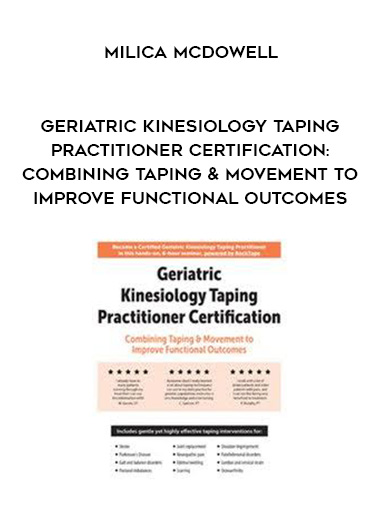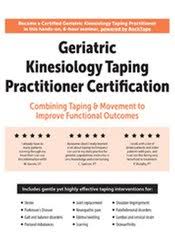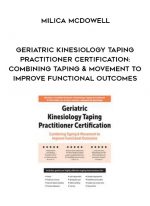
From joint replacements to stroke recovery, kinesiology tape has rapidly gained popularity in geriatric rehabilitation due to its unique ability to improve movement and function. One the most versatile treatment tools in rehab, taping has been shown to improve outcomes with a vast variety of therapies, including functional movement therapies, manual therapy, splinting, NDT (Neurodevelopmental Treatment), Hippo- and Aquatic Therapies, and more.
This lab-intensivecertification recording will equip you with gentle yet highly effective taping techniques to improve functional outcomes with a multitude of geriatric-related conditions. Explore the fundamentals of modern taping techniques, discover advanced interventions that integrate the latest neuroscience research, and learn how to combine taping with functional movement to produce the kinds of active treatments that are revolutionizing rehab. Numerous case studies will be presented that demonstrate how taping can help deliver superior rehab outcomes, and hands-on labs throughout the program will show you how to get impressive results with your patients.
- Review the principles of kinesiology taping and supporting evidence
- Describe the physiological and neurological effects of kinesiology taping for geriatric patient populations
- Demonstrate how to apply tape with appropriate tension for best results with geriatric patients
- Compare and contrast common taping techniques and review indications/contraindications for each
- Apply and demonstrate functional taping applications for geriatric-related postural, orthopedic, inflammatory and neurological conditions.
- Develop taping applications based on your assessment/treatment approach and the individual needs of your patient
Principles of Kinesiology Taping
- Evolution of kinesiology taping
- Differences between kinesiology tapes
- Evidence supporting kinesiology taping
Physiological/Neurological Benefits of Taping For the Geriatric Patient
- Skin-brain connection
- Peripheral nerves
- Sensory system/receptors
- Histology of skin
Fundamental Taping Techniques and Treatment Strategies
- Types of taping
- Techniques
- Cuts
- Tension
- Care tips
- Indications/contraindications
- Special considerations for geriatric patients
- Combining taping with movement
HAND-ON LAB
TAPING FOR ORTHOPEDIC CONDITIONS
- Methods and application
- Effects and benefits
- Upper extremity
- Trunk/Lower extremity
- Interventions for:
- Shoulder impingement
- Patellofemoral disorders
- Lumbar and cervical strain
- Osteoarthritis
- Joint replacement
HAND-ON LAB
FLUID DYNAMICS TAPING
- Methods and application
- Effects and benefits
- Decompression strategy vs. compression strategy
- Interventions for
- Bruising
- Swelling
- Edema
HAND-ON LAB
POSTURE TAPING
- Methods and application
- Effects and benefits
- Postural taping framework
- Posture evaluation from head to toe
- Common postural dysfunctions
- Interventions for postural imbalances
HAND-ON LAB
SCAR TAPING
- Methods and application
- Effects and benefits
- Scar tissue assessment
- Scar tissue framework
- Special populations and conditions
- Interventions for scarring
HANDS-ON LAB
TAPING FOR NEUROLOGICAL CONDITIONS
- Methods and applications
- Effects and benefits
- Nerve tract irritation
- Upper and lower extremities
- Interventions for:
- Stroke
- Parkinson’s
- Gait and balance disorders
HANDS-ON LAB
CODING AND DOCUMENTATION FOR REIMBURSEMENT
CASE STUDIES AND PROBLEM SOLVING


































Reviews
There are no reviews yet.